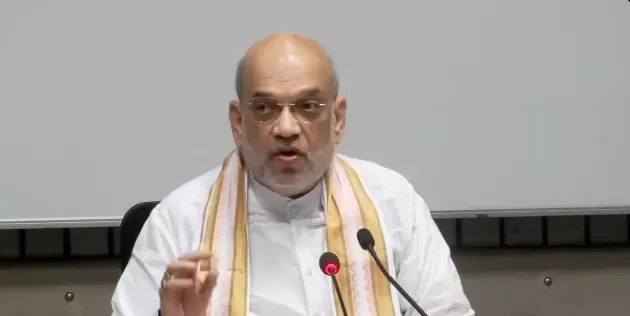Amit Shah Defends New Criminal Laws Amid Opposition Protests

New Delhi: Amid the objections raised by the Opposition, including the Congress Party, over the implementation of the three new criminal laws which came into force on Monday, Union home minister Amit Shah said on Monday that these laws’ emphasis was on justice, not punishment, and appealed to them not to indulge in politics, claiming that these laws have been brought after wide consultation.
Mr Shah, who spearheaded the three new criminal laws, however, maintained that he and the government are open for any constructive suggestions and, if required, changes in the laws could be incorporated.
Addressing a press conference in the Parliament House complex, he said: “I am ready to meet anyone who wants. We will meet and also review. But please, do not do politics,” he said at the press conference, while replying to questions on the protests by the Opposition leaders.
Rejecting criticism that the three new criminal laws were draconian and repressive, the home minister said the laws were modern, protect the rights of the victims, and fix accountability on the police forces.
Saying that justice would be delivered up to the level of the Supreme Court in all cases within three years of the registration of an FIR under the new criminal laws, he expressed hope of a reduction of crime in future as 90 per cent conviction was expected under the new laws.
Rejecting the criticism that the three new criminal laws -- Bharatiya Nyaya Sanhita (BNS), Bharatiya Nagarik Suraksha Sanhita (BNSS) and the Bharatiya Sakshya Adhiniyam (BSA) -- were draconian and repressive, Mr Shah said the criticism was aimed at misleading people. “These laws were passed after debates in both Houses and scrutinised by a parliamentary standing committee,” he said, adding that most of the suggestions given by the Opposition members in the panel were accepted “except those with political colour”.
“The new laws brought in a modern justice system, incorporating provisions such as Zero FIR, online registration of police complaints, summonses through electronic modes such as SMS and mandatory videography of crime scenes for all heinous crimes,” he said.
Mr Shah said the first case under the new laws was about a motorcycle theft registered in Madhya Pradesh's Gwalior at 10 minutes past midnight.
He also said the police dismissed the case filed against a street vendor for selling water and tobacco products from a cart that allegedly obstructed a public way in central Delhi's Kamala Market after an investigation.
The new laws would give priority to providing justice, unlike the colonial-era laws that gave primacy to penal action, and made reporting of crimes even easier by recognising e-FIR, Zero FIR and electronic or digital evidence, Mr Shah noted.
According to the new laws, judgments in criminal cases had to come within 45 days of completion of the trial whereas the charges must be framed within 60 days of the first hearing, the home minister said. The new laws promote a justice-centric approach by providing community service for minor crimes, he added.
Claiming the new laws were justice-centric, he said that provisions have been made for community service for minor crimes. He said a new chapter on crimes against women and children was added, buying and selling of any child made a heinous crime and a provision for death sentence or life imprisonment for gangrape of a minor included organised crime, acts of terrorism and mob lynching had been defined, sedition was replaced with treason and video recording of all search and seizures made mandatory.
A new provision has been added in cases of having physical relations after giving false promise of marriage and statement of rape victims will be recorded by a woman police officer in presence of her guardian, he said.
Mr Shah also made it clear that the BNS, the provision of maximum 15-day police custody like the erstwhile IPC and dispelled confusion that the remand period has been extended. He also said that confusion was being created that the time period has been increased for police remand.
"I want to clarify that in BNS also the remand period is 15 days. Earlier, if an accused was sent to police remand and he got himself admitted in a hospital for 15 days, then there was no interrogation as his remand period used to expire. In BNS, there will be remand for a maximum 15 days, but it can be taken in parts within the upper limit of 60 days,” he said.
Officials said under the new laws, overlapping sections were merged and simplified, with only 358 sections against 511 in the Indian Penal Code. For example, definitions scattered from sections 6 to 52 have been brought under one section.
Eighteen sections already stand repealed and four relating to weights and measures are covered under the Legal Metrology Act 2009.
Instances of false promise of marriage, gangrape of minors, mob lynching and chain snatching, among others, are reported but the Indian Penal Code did not have specific provisions for dealing with such incidents. These have been addressed in the BNS, the officials said.
A new provision has been made for cases such as abandonment of women after making sexual relations on the false promise of marriage.
Under the new laws, a person can now report incidents by electronic communication, without the need to physically visit a police station. This allows for easier and quicker reporting, facilitating prompt action by the police.
With the introduction of Zero FIR, a person can file a First Information Report (FIR) at any police station, regardless of jurisdiction.

